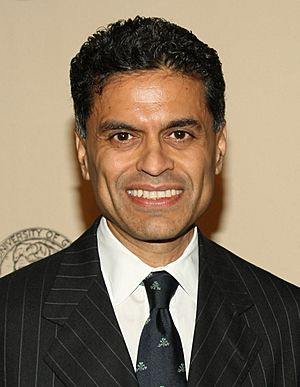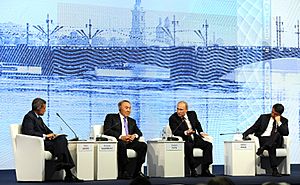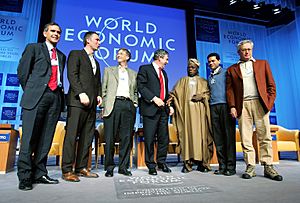Fareed Zakaria facts for kids
Quick facts for kids
Fareed Zakaria
|
|
|---|---|

Zakaria in 2012
|
|
| Born |
Fareed Rafiq Zakaria
January 20, 1964 Mumbai, Maharashtra, India
|
| Education | Yale University (BA) Harvard University (MA, PhD) |
| Occupation |
|
| Employer | CNN |
|
Notable credit(s)
|
Fareed Zakaria GPS, host (2008–present) Time, contributing editor (2010–2014) Newsweek International, editor (2000–2010) Foreign Exchange, host (2005–2007) Foreign Affairs, former managing editor |
| Spouse(s) |
Paula Throckmorton
(m. 1997; div. 2018) |
| Children | 3 |
| Parent(s) | Rafiq Zakaria (father) Fatima Zakaria (mother) |
| Relatives | Arif Zakaria (cousin) Asif Zakaria (cousin) |
| Awards | Padma Bhushan (2010) |
| Signature | |
 |
|
Fareed Rafiq Zakaria (born January 20, 1964) is an American journalist, writer, and political commentator. He was born in India. He hosts a show called Fareed Zakaria GPS on CNN. He also writes a weekly column for The Washington Post. Before this, he worked for Newsweek and Time magazines.
Contents
Early Life and Education
Fareed Zakaria was born in Mumbai, India. His family was from the Konkan region. His father, Rafiq Zakaria, was a politician and a scholar. His mother, Fatima Zakaria, was an editor for the Sunday Times of India. She passed away during the COVID-19 pandemic.
Zakaria went to the Cathedral and John Connon School in Mumbai. He later moved to the United States for college. In 1986, he earned a Bachelor of Arts degree from Yale University. While at Yale, he was very active in student politics and writing. He was president of the Yale Political Union. He also edited the Yale Political Monthly magazine.
He continued his studies at Harvard University. In 1993, he earned a PhD in government. He studied with important thinkers like Samuel P. Huntington and Robert Keohane.
A Career in Journalism and Writing
After finishing his studies, Zakaria worked on a research project at Harvard. This project focused on American foreign policy. In 1992, at just 28 years old, he became the managing editor of Foreign Affairs magazine. He helped change the magazine to be published every two months.
He also taught a class on international relations at Columbia University. In 2000, he became the editor of Newsweek International. He also started writing a weekly column for Newsweek. Later, in 2010, he moved to Time magazine. There, he worked as an editor-at-large and continued writing columns.
Today, he writes a weekly column for The Washington Post. He also contributes to the Atlantic Media group. His articles have appeared in many other well-known publications. These include The New York Times and The Wall Street Journal.
Books by Fareed Zakaria
Zakaria has written several important books. His first book was From Wealth to Power (1998). It explored how America became a world power.
His book The Future of Freedom (2003) talks about democracy. It explains that true democracy needs more than just elections. It also needs to protect people's freedoms and follow the rule of law. He calls this "liberal democracy."
The Post-American World (2008) discusses how other countries are growing stronger. It talks about the rise of nations like China, India, and Brazil. This book was updated in 2011.
His book In Defense of a Liberal Education (2015) highlights the importance of a broad education. Many of his books have become New York Times bestsellers. They have been translated into many languages.
Television Shows and Media Work
Zakaria has been a familiar face on television. From 2002 to 2007, he was a news analyst for This Week with George Stephanopoulos on ABC. He also hosted a weekly TV show on PBS called Foreign Exchange from 2005 to 2008.
His most famous show is Fareed Zakaria GPS (Global Public Square) on CNN. It started in June 2008. The show airs multiple times a week. It reaches millions of homes around the world. In 2013, he also became a producer for the HBO series Vice.
Understanding His Political Views
Fareed Zakaria describes himself as a "centrist." This means he often holds views that are in the middle. People have described him in different ways. Some call him a liberal, others a conservative, or a moderate.
He believes it's important not to stick to one political side. He tries to explain what is happening in the world. He supported Barack Obama during his presidential campaign in 2008.
Zakaria has often shared his thoughts on global issues. After the 9/11 terrorist attacks, he wrote about Islamic extremism. He argued that the problem was not Islam itself. Instead, it came from problems in Arab societies. He suggested that these societies needed to become more open.
He initially supported the 2003 invasion of Iraq. However, he soon became a critic of how the war was managed. He believed a much larger force was needed. He also disagreed with some of the decisions made during the occupation of Iraq. He later wrote that while the military part of the war "succeeded," it did not bring political unity to Iraq.
In 2017, he supported the 2017 Shayrat missile strike by the U.S. against a Syrian airbase. He praised President Donald Trump for this action.
In 2020, Zakaria signed a letter called "A Letter on Justice and Open Debate." This letter expressed concern about limiting the free exchange of ideas. In 2021, he talked about the size of the U.S. military budget. He compared it to China's spending on its Belt and Road Initiative. He questioned which investment was better for the future.
In 2022, he wrote an article for The Washington Post. He suggested that the Democratic Party should focus on practical issues. He felt they should work on "building things" and making government work better for people.

Awards and Achievements
Fareed Zakaria has received many honors for his work. In 2010, he won the National Magazine Award for his columns. His show, Fareed Zakaria GPS, has won a Peabody Award. It has also been nominated for several Emmy Awards.
In 2009, he received the India Abroad Person of the Year award. The Indian government gave him the Padma Bhushan award in 2010. This was for his important contributions to journalism. In 2019, Foreign Policy magazine named him one of the "Top 10 Global Thinker of the Last 10 Years." In 2020, he received the Founders Award for Excellence in Journalism.
He has also received honorary degrees from many universities. These include Harvard University, Brown University, and Duke University. He has served on the boards of important organizations. These include the Council on Foreign Relations and the governing body of Yale University.
Personal Life
Fareed Zakaria is a naturalized citizen of the United States. This means he was born in another country but became a U.S. citizen. In 1997, he married Paula Throckmorton. She is a jewelry designer. They had three children together. In 2018, they separated.
He lives in New York City. He enjoys cooking and learned a lot from famous chefs. Zakaria describes himself as a secular person. He says his views on faith are complicated. His children were not raised as Muslims.
See also
 In Spanish: Fareed Zakaria para niños
In Spanish: Fareed Zakaria para niños
- Indians in the New York City metropolitan region
- List of Yale University people
- List of Harvard University people
- New Yorkers in journalism


